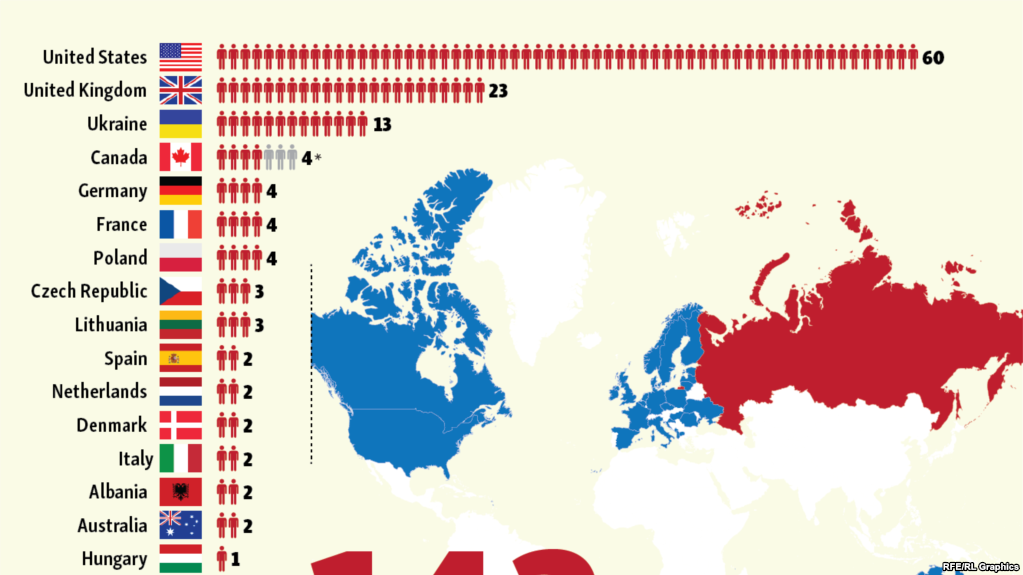
By Polygraph
“After receiving this information I’ve expressed a strong protest regarding today’s unlawful actions by the United States of America and I emphasized that to this day there is not a single bit of evidence of Russia’s interference in the investigation of the case (Skripal) as such, as well as of Russia’s involvement in this tragedy that took place in Salisbury.”
FALSE
The U.S. acted in accordance with the International law
British Prime Minister Theresa May said 18 countries have announced plans to expel Russian Intelligence officers in response to Moscow’s suspected involvement in a nerve agent attack in England on a former Russian spy this month. The United States said it would expel 60 Russian diplomats, joining governments across Europe.
Two Russian ambassadors, on at the United Nations and one in Washington, DC accused the U.S. of acting improperly.
In Washington, Russian Ambassador to the United States, Anatoly Antonov called the U.S. actions “unlawful,” repeating Kremlin’s denial of Russia’s involvement in the poisoning of the ex-GRU spy and his daughter in Britain on March 4.
Anatoly Antonov as a Russian senior diplomat represents one of the 60 countries that are signatories of the Vienna Convention on Diplomatic Relations.
Signed in April 1961, the Vienna Convention on Diplomatic Relations is an international treaty that sets the rules of diplomatic relations between independent countries. The original “equally authentic” texts of the Convection were presented and signed by all parties in five languages, including Russian.
The Article 9 of the Vienna Convention reads:
1.“The receiving State may at any time and without having to explain its decision, notify the sending State that the head of the mission or any member of the diplomatic staff of the mission is persona non grata. In any such case the sending State shall, as appropriate, either recall the person concerned or terminate his functions with the mission.”
Thus, Russian Ambassador’s claim that the United States acted “unlawfully” when expelling Russian mission staff does not stand a basic fact-check and is false.
At the U.N., Russian Ambassador Vassily Nebenzia said, Washington has “abused its power” as the host of the UN headquarters when it moved to expel 12 staffers from Russia’s mission at the UN, Russia Today reported on Monday.
The United States Ambassador to the UN, Nikki Haley said in statement the expulsions were in “accordance with the 1947 US-UN Headquarters Agreement.”
“So, contrary to what the Russian ambassador said, the U.S. has acted in accordance with the international laws and regulations,” the U.N. statement said.
The U.N.’s statement laid down the conditions under which the U.S. could expel a diplomat.
In early March, Former spy Sergei Skripal and his daughter, Yulia, were found unconscious on a park bench in the English town of Salisbury and rushed to the hospital, where they remain in serious condition.
White House Press Secretary Sarah Huckabee Sanders said in a statement, announcing the expulsion Monday:
“The United States takes this action in conjunction with our NATO allies and partners around the world in response to Russia’s use of a military-grade chemical weapon on the soil of the United Kingdom, the latest in its ongoing pattern of destabilizing activities around the world.”
Antonov also states “there is not a single bit of evidence” of Russia’s involvement in the Skripal poisoning. Polygraph.info has previously examined and debunked a similar Russian claim. British experts at the Porton Down research facility identified the nerve agent as the one developed on Russian soil in the former Soviet Union.
Another Russian claim is that “any country with at least some chemistry” could have synthesized Novichok. Given that a scientist who admitted to involvement in Novichok development published formulas for the nerve agent, Polygraph.info found that is possible but that Britain had submitted its findings to the Organization for the Prohibition of Chemical Weapons (OPCW), which is conducting an independent evaluation.
By Polygraph





